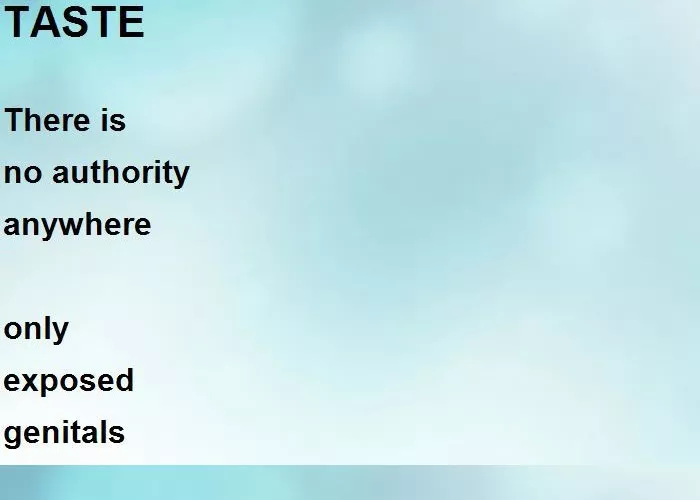Welcome to Poem of the Day – Taste by Shuntarō Tanikawa.
Shuntarō Tanikawa, one of Japan’s most renowned contemporary poets, often explores themes of existentialism, human nature, and the complexities of life in his works. One of his most intriguing poems, “Taste,” captures the fragility of human experience through stark, vivid language and abstract imagery. In this essay, we will delve into the core themes of Tanikawa’s poem “Taste,” examining its minimalistic language, its evocative imagery, and its exploration of the absence of authority in human life.
Taste Poem
There is
no authority
anywhere
only
exposed
genitals
erect
concave
at night
There is already a subtle
taste of deceit
Taste Poem Explanation
“Taste” by Tanikawa is concise, featuring only a few lines yet possessing a profound resonance. The poem’s brevity is striking, and its minimalist approach to language forces the reader to engage deeply with each word. The structure mirrors the themes of the poem: sparse, unadorned, and direct. This simplicity in form, coupled with the provocative nature of the language, evokes an immediacy that invites reflection.
The first line, “There is no authority anywhere,” immediately sets the tone of the poem. It is a bold, declarative statement that challenges established concepts of power, control, and order. The lack of authority is not just a political or social statement but an existential one, suggesting that there are no higher powers or guiding forces that govern the individual experience. This absence leaves the subject in a state of raw exposure, unprotected and vulnerable.
The Evocative Imagery: “Exposed Genitals”
Following the initial assertion of no authority, the poem abruptly shifts to the image of “exposed genitals.” This phrase is both shocking and disorienting. On one level, it can be interpreted as a representation of vulnerability—genitals being a symbol of human intimacy and sexuality, often kept private or concealed. Tanikawa’s choice to expose them in this context could be a metaphor for the unfiltered, raw nature of human existence. Without authority or protective structures, the individual is laid bare, exposed to the world in its most primal form.
The image of exposed genitals also carries a sense of discomfort. In most cultures, this part of the body is seen as private and protected. Its revelation in the poem strips away layers of social normativity, leaving behind only the most basic, instinctual human experience. This can be understood as a comment on the vulnerability of the human condition, especially in the absence of societal structures or moral codes that typically govern behavior and interactions.
The Absence of Authority and Its Implications
At the heart of “Taste” is a meditation on the absence of authority. Tanikawa’s assertion that “there is no authority anywhere” suggests a world devoid of conventional rules, structures, or higher powers that would typically impose order. This may evoke feelings of disorientation, chaos, and uncertainty. The poem paints a picture of human existence without the comforting illusions of control or stability.
In a world without authority, individuals are left to navigate their own experiences. They must grapple with their vulnerability, their desires, and their instincts. There is no higher force to dictate their actions, no external structure to provide meaning or purpose. In this sense, the “exposed genitals” become a metaphor not just for physical vulnerability but for existential exposure—humans are left to face themselves and their desires in their most primal form, without the comfort of societal constraints.
This theme resonates with the broader existentialist thought, which posits that in a world without inherent meaning, individuals must create their own purpose. Tanikawa’s poem suggests that in the absence of authority, we are not merely passive victims of chaos, but active agents in shaping our own reality. The poem challenges the reader to reflect on the essence of human existence, both in its fragility and its potential for self-determination.
Taste as a Sensory Experience and Metaphor for Understanding
The title of the poem, “Taste,” also plays a crucial role in the poem’s meaning. Taste is a sensory experience, one that is intimately linked with our understanding of the world around us. In the context of this poem, “taste” can be interpreted as a metaphor for how we perceive and experience the world in the absence of authority or societal conventions. Taste is subjective, personal, and often deeply connected with desire and instinct. It is an experience that cannot be dictated or controlled by external forces; rather, it is shaped by individual perception and response.
The poem’s minimalist language, paired with its evocative imagery, suggests that our experience of the world is, in many ways, raw and unfiltered. We encounter life through our senses, without the comforting veil of authority or societal expectations. The poem invites us to consider what it means to “taste” life when we are unprotected, when the conventional structures that govern behavior are absent, and when we are exposed in our most vulnerable state.
Conclusion
“Taste” by Shuntarō Tanikawa is a profound meditation on the absence of authority and the vulnerability inherent in human existence. Through its stark language and evocative imagery, the poem challenges readers to confront the rawness of life, stripped of societal protections and norms. It invites us to consider the nature of our existence without external control, to reflect on what it means to be exposed, and to grapple with the complexities of human desire, vulnerability, and self-determination. The poem leaves us with a lingering question: in a world without authority, how do we navigate our lives and make sense of our experience?
In essence, “Taste” is an invitation to reflect on the fundamental nature of being human—vulnerable, exposed, and free to define our own meaning in a world devoid of external authority. It is a powerful exploration of the self in a state of existential freedom.

